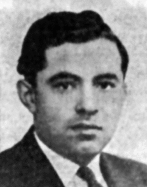 Jacoub Noah Shak, the son of Reuven and Rachel, was born in Poland on 2nd November 1921. When still a child, his parents emigrated to Belgium and settled in Antwerp, where he grew up. He was educated at a religious elementary school, learning both Yiddish and Hebrew. On completing high school he began working as a diamond polisher.
Jacoub Noah Shak, the son of Reuven and Rachel, was born in Poland on 2nd November 1921. When still a child, his parents emigrated to Belgium and settled in Antwerp, where he grew up. He was educated at a religious elementary school, learning both Yiddish and Hebrew. On completing high school he began working as a diamond polisher.
At the outbreak of World War II, there were 65,000 Jews residing in Belgium, concentrated in the main cities. Only about one-tenth of these Jews were Belgian citizens; the remainder were from Eastern Europe and Germany. Most of these Jews who had emigrated to Belgium formed communities, synagogues and organizations, which bound them together.
When the Nazis invaded Belgium on 10th May 1940, there were two political parties, each with a different policy: the government-in-exile in London, which sided with the allies, and the other which joined forces with the Germans. During the period of German control, many anti-Jewish injunctions were decreed, Jews were fired from public office, their activities restricted and they were banished from economic activities. In May 1942 the Jews were forced to wear yellow armbands.
In May 1942, 2,000 Jews were recruited into forced labor. The majority worked in building fortifications along the coast of northern France, and later they were sent to extermination camps.
The worsening of their social and economic situation hit the Jewish community hard, and widened the gap between the Jews of who held Belgian citizenship, and the other Jews, the “immigrants.”
The “Final Solution” for the Belgian Jews began in the spring of 1942. At the end of July 1942 Jews were deported to various concentration and work camps, up until September 1943. The majority were sent to Auschwitz. Small groups were sent to Buchenwald, Ravensbruck and Bergen-Belsen.
In the final count, more than 35,000 Belgian Jews were dispatched, the majority of whom were murdered. All of Jacoub Noah Shak’s family was taken to concentration camps, and met their death there. He was the only one of his family who survived, after three years of cruel conditions in a slave labor camp.
On being freed, he returned to Brussels and from there he moved to Antwerp, awaiting an entry permit to the USA, where an aunt and other relatives resided. In those days of denial and cruelty, he had learned how to adapt to all conditions, but he made a firm decision to abandon the “Continent of the Damned” (his expression). “Here I lost all that was dear to me,” he wrote.
The struggle with the British and the Arabs in Israel’s War of Independence awoke in him a feeling for his homeland, and he felt that he had to do something. He left Belgium for France and joined a Machal group, arriving in Israel on 13th July 1948. While on the ship, he served as a translator for passengers on board; the passengers spoke eight different languages, and his knowledge of Hebrew proved useful.
Upon his arrival, he joined the 54th battalion of the Givati Brigade, and displayed great courage, distinguishing himself in his duties as a company combat medic. He sent letters to his relatives in the USA which were full of excitement about being in Israel, and wrote, “We did not come here to play games.”
On 25th November 1948, Jacoub Shak fought in a battle with his unit in the Iraq-el-Manshiya area.¹ While treating a wounded comrade during the fire-fight, he was hit in the head and died of his wounds.
Jacoub was one of twenty-seven soldiers who fell that day, and all were buried at the military cemetery of Kfar Warburg.
¹ Note:
Iraq-el-Manshiya was an Arab village nearby an ancient archaeological site (today an historical site in the vicinity of Kiryat Gat) which had been converted into an Egyptian fortified position, and part of the Faluja pocket where thousands of Egyptian soldiers were concentrated after the summer of 1948. The main force of the Egyptians was based close to the road between Majdal (today Migdal) and Bet Jubrin (today Beit Guvrin); this was in order to connect the axis of their invasion of the coastal plain to Mount Hebron.
The length of the Egyptian fortifications isolated the Negev from the State of Israel, and threatened the surrounding Jewish settlements. A number of attempts to break through and conquer Iraq-el-Manshiya, including Operation “Yoav” in October 1948, were unsuccessful.
The Iraq-el-Manshiya area returned to Israel control after Operation “Horev” and the ceasefire with the Egyptians in January 1949.
Source: Translated from the Yizkor website by Joe Woolf, and researcher’s note addition by Joe Woolf.

